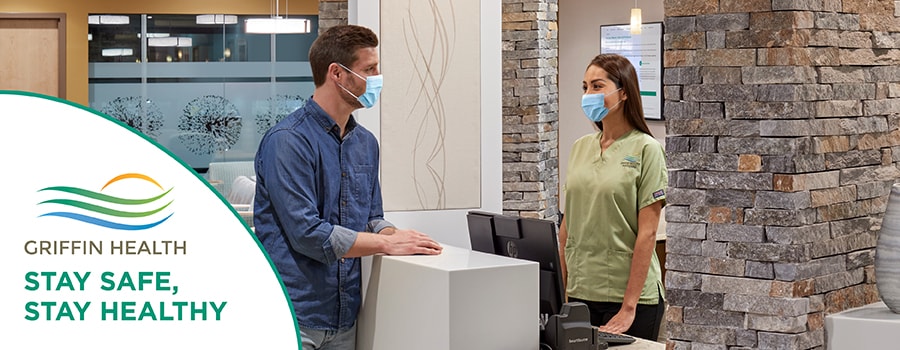
COVID-19 Vaccination
For the latest information on COVID-19 vaccination (scheduling, community sites, eligibility, etc.) through Griffin Health, please visit griffinhealth.org/vaccinations.
Covid-19 Testing
Avoid the lines! Come to Griffin for your COVID-19 test. Call 203-437-6815.
Griffin Health has been approved by the Connecticut Department of Public Health to provide COVID-19 testing at our Medical Office Building at 300 Seymour Avenue in Derby (across the street from Griffin Hospital). The cost of a COVID-19 test for a self-pay patient may vary.
Our appointment-only site gives you minimal on-site waiting – and receive your COVID-19 test results within 24-48 hours!
For locations, scheduling, and hours please see our testing locations.
Experiencing Post Covid-19 Symptoms?
Sometimes COVID-19 symptoms can last for months, due to damage caused to lungs, heart, and the brain after first being infected with the virus that caused COVID-19. These conditions are sometimes named “Long COVID” or “Post-COVID-19 Syndrome,” while others refer to themselves as “Long Haulers.” Regardless of the name given, take comfort knowing that help is available. Most people with Post-COVID Syndrome or Long COVID experience the effects of COVID-19 that persist for more than four weeks after being diagnosed with the COVID-19 virus.
Griffin Health Long COVID-19 Therapy provides a compassionate, comprehensive and coordinated approach to treating Long COVID-19 that empowers individuals to manage and significantly improve their symptoms. We’re here to help “COVID-19 Long haulers” safely and confidently overcome symptoms that are affecting their education, work, sleep and favorite activities. Visit our Post COVID-19 Relief page to learn more.
We’re here for you
In the best of times and in the most challenging times, we are here to help you stay safe and stay healthy.
Urgent medical care needs don’t stop for COVID-19, and your health is too important to postpone necessary care. That’s why we have taken extra precautions to ensure your safety so you can receive the care you need from our health experts.
Plan to Visit Griffin Hospital?
If you are planning to visit a loved one who is an inpatient at Griffin Hospital, please review our updated Visitation Guidelines at patient visitor information.
Stay healthy – don’t delay care
If it’s time for your annual check-up, for preventive tests like mammograms and colonoscopies, or for diagnostic procedures like a cardiac stress test, your health is too important to postpone necessary care.
Delaying care can lead to complications and advanced stages of disease. Waiting can make medical issues worse and result in long-term damage that could have been avoided. If you suffer from a chronic disease such as diabetes, hypertension, or asthma, it is essential for you to maintain your regular care and continue taking your medication.
Emergencies don’t stop for COVID-19
You may think it’s risky to seek medical care with COVID-19 in the community, but waiting too long to get help for medical issues or life-threatening conditions can be far more dangerous than COVID-19.
If you experience symptoms or a change in your health, please contact us even if you don’t think your symptoms are urgent. We are here to help and can discuss the best way to get the care you need.
If you are experiencing other more serious symptoms, like difficulty breathing or pain in the chest or abdomen, call 911 immediately. Just as our office has taken steps to ensure your safety, Griffin Hospital has done the same and is ready to take care of anyone needing emergency and urgent care.
Want to make a donation?
If you or someone you know is interested in supporting Griffin Health and our Caregivers so we can continue to do everything possible to maintain and replenish valuable supplies, there are two ways you can help. Click here to learn more.
Information about COVID-19
Griffin Health has been following the developing risk posed by coronavirus (COVID-19) closely.We are constantly monitoring the spread of the virus, and continue to closely follow new guidelines or recommendations issued by the CDC as the public health community learns more about how COVID-19 is contracted, spread, and most effectively treated.
Information on the COVID-19 situation is evolving rapidly. For the latest updates, visit the CDC website at Covid-19.
Griffin Health offers the following information to help keep our community aware of potential spread of the virus in our community and learn ways to reduce possible exposure:
Background
The coronavirus COVID-19 was first detected in Wuhan City, Hubei Province, China. The virus has been detected in over 50 countries internationally, including the United States.
Coronaviruses are a family of (+) RNA viruses that can cause respiratory illness in humans. They get their name, “corona,” from the many crown-like spikes on the surface of the virus. They are common in many different species of animals (camels, cattle, cats, and bats). Rarely, animal coronaviruses can infect people and then spread between people such as with SARS-CoV, MERS-CoV and now COVID-19.
COVID-19 is primarily spread through respiratory droplets. Generally, individuals within six feet of someone who is contagious and come into contact with these droplets will be infected. A person can get COVID-19 by touching a surface or object that has the virus on it and then touching their own mouth, nose, or possibly their eyes, but this is not thought to be the main way the virus spreads.
Symptoms of COVID-19 appear within two to 14 days after exposure and include:
- Fever
- Cough
- Difficulty breathing (shortness of breath)
In the large majority of those infected, COVID-19 causes only mild cold symptoms. Severe cases can lead to pneumonia, difficulty breathing and death. According to data from China, the elderly (70+), and those with pre-existing medical conditions appear to be more vulnerable to the virus.
If you suspect you may have COVID-19, call your healthcare provider to discuss your symptoms and recent travel. Your physician will instruct you how to proceed with any care you need.
If your symptoms worsen, including difficulty breathing, persistent pain or pressure in the chest, new confusion or inability to arouse or bluish lips or face, call 9-1-1 or go to a nearby emergency department for evaluation.
How You Can Be Prepared
As the number of confirmed cases of COVID-19 increases in Connecticut, we strongly encourage individuals to practice proven methods to protect themselves from exposure to respiratory viruses.
The most important you can do to protect yourself from respiratory viruses is to practice good hand hygiene. You should wash your hands often, especially when visiting a public place like your workplace, a store, or a school. Wash with soap and water for at least 20 seconds, or use an alcohol-based hand sanitizer that contains at least 60% alcohol if soap and water are not available. Additionally, avoid touching your eyes, nose, and mouth with unwashed hands.
In addition to protecting themselves, individuals have a responsibility to help prevent the spread of a respiratory virus. You should avoid close contact with people who are sick, and stay home if you are sick. Always cover your mouth with a tissue when you cough or sneeze and throw the tissue in the trash, then wash your hands. At your home and work, clean and disinfect frequently touched objects and surfaces.
The symptoms for COVID-19 include fever, cough and shortness of breath. Anyone who is experiencing these symptoms and has travelled to area where there have been confirmed cases of COVID-19, or have come in close contact with a person who is being evaluated for the virus, should contact their healthcare provider immediately for instruction on what you should do.
If you have flu-like symptoms, you should stay home and help relieve symptoms by getting rest, staying hydrated and taking steps to control your fever.
If you are unclear or concerned about your symptoms, you should contact your healthcare provider. Your physician will instruct you how to proceed with any care you need.
For severe symptoms, including difficulty breathing, persistent pain or pressure in the chest, new confusion or inability to arouse or bluish lips or face, call 911 or go to a nearby emergency department for evaluation.
For more information on COVID-19, visit the CDC website at Covid-19.
These steps are based upon the most up-to-date recommendations developed by the Centers for Disease Control (CDC) and the Connecticut Department of Public Health for identifying, isolating, and treating airborne viruses like influenza.
COVID-19 Radio Updates and Podcast
Griffin Health Chief Medical Officer and Infectious Diseases Physician Dr. Frederick Browne has been providing information on COVID-19, its symptoms, who’s at risk, how the virus is transmitted, and how you can help prevent your exposure to the virus and contain its spread as well as developments with vaccination, testing and virus variants. Dr. Browne appears live every Thursday morning at 8:38 on WICC 600 AM and 107.3 FM, or listen to the podcast here: Dr. Browne WICC Podcast

